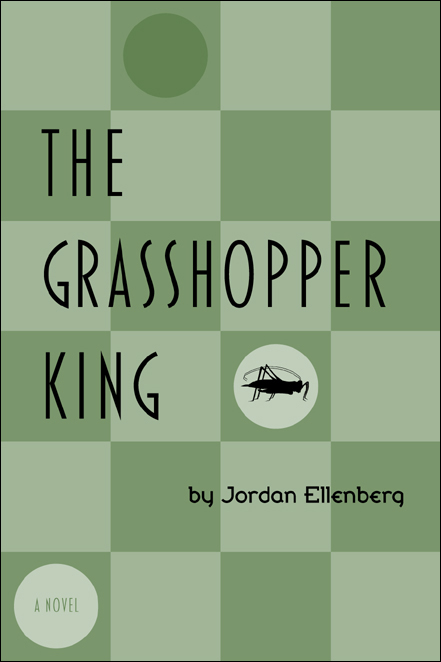The Grasshopper King
Read The Grasshopper King Online
Authors: Jordan Ellenberg


THE GRASSHOPPER KING


C
OPYRIGHT
© 2003 by Jordan Ellenberg
C
OVER
+ B
OOK
D
ESIGN
by Linda S. Koutsky
C
OVER
I
LLUSTRATION
by Marcia McEachron
A
UTHOR
P
HOTOGRAPH
© Pryde Brown
Coffee House Press books are available to the trade through our primary distributor, Consortium Book Sales & Distribution,
cbsd.com
or (800) 283-3572. For personal orders, catalogs, or other information, write to:
[email protected]
.
Coffee House Press is a nonprofit literary publishing house. Support from private foundations, corporate giving programs, government programs, and generous individuals helps make the publication of our books possible. We gratefully acknowledge their support in detail in the back of this book.
Visit us at at
coffeehousepress.org
.
To you and our many readers across the country, we send our thanks for your continuing support.
L
IBRARY OF
C
ONGRESS CIP
I
NFORMATION
Ellenberg, Jordan, 1971â
The grasshopper king / by Jordan Ellenberg. â 1st ed.
p. cm
ISBN
978-1-56689-386-2
1. EuropeâStudy and teaching (Higher)âFiction. 2. PoetryâStudy and teaching (Higher)âFiction. 3. College teachersâFiction. I. Title.
PS
3605.
L
435
G
73 2003
813'.6â
DC
21
2003041236
First and most, I thank my teachers:
Harold White, Adrienne Marek, and Peggy Pfeiffer.
Thanks, too, to Stephen Burt, Malinda McCollum, and Tanya Schlam;
Michael Martone and Jill McCorkle; the Writing Seminars at Johns Hopkins;
Jay Mandel, Rosalie Siegel, and everyone at Coffee House Press.

for my parents
THE GRASSHOPPER KING
CONTENTS
Chapter 1: Athenae Occidentalis Americae
Chapter 2: A Little About Myself
Chapter 3: Little Bug, Little Bug
Chapter 5: Henderson Between the Wars
Chapter 7: The Grasshopper King
Recent Fiction from Coffee House Press

“T
ITHONUS
:
a member of the royal family of Troy, who married Eos, the goddess of dawn, and subsequently suffered an unusual fate. Eos loved Tithonus desperately, and could not bear the fact that, as a mortal, he was doomed to leave her when his time for death had come. So she petitioned the gods to grant Tithonus immortality; and her heartfelt request was granted. But Eos had forgotten to ask also for eternal youth. So Tithonus grew older and older, unable to die. His mind became deranged and he lost the power of speech. Eos kept him in a baby's crib in a locked room. Some versions of the story have it that, out of mercy, Eos eventually transformed poor Tithonus into the chirping grasshopper
.”
âH
EINRICH
D
UBLER
,
Enzyklopädie der griechischen Mythologie
I think it's best that I begin with a legendâa mostly true one.
It goes like this: in 1871, a luckless prospector and aesthete named Tip Chandler, lost in the desert, his mules weakening and his canteen two days empty, came to the edge of a tremendous mesa. Seeing that he could travel no farther, and knowing that no salvation lay behind him, he fell to his knees and resigned himself to death. But at that moment, a spring of fresh water gushed out from the desiccated ground. Chandler threw himself down, pressed his lips to the earth, and drank; and when, at last, bloated and drenched, he allowed himself to lift his head and breathe, he was overtaken by a vision. He saw, he wrote later, “a splendid City, replete with and dedicated to the sundry pursuits of Knowledge, Art, and Faith; truly a second Athens, through whose avenues progressed Architects, Mathematicians, Clergymen, Poets, and Scientists of all sorts; and having in it a great College, which stood upon the Cliffside, a Testament to the Power of Reason whose Beacon shined forth unto the savage and uncomprehending Plain!”
Hallucinations were hallucinations, and Chandler had seen his share; but the next morning, fortified by the springwater and the roasted flanks of his mules, the old prospector, for the first time in his dismal career, struck gold. As was customary, he interpreted his
good fortune as a supernatural directive. He devoted the remainder of his life, and the balance of his riches, to realizing the learned city of his vision.
But the architects and the poets, for the most part, stayed East, and the ones who did not stay passed over Chandler's city for the more agreeable frontier of California. The museums and zoos were never built; the electric railway, half-completed at the time of Chandler's death, was left to sink, slat by slat, into the clay. The streetsâlaid out in golden rectangles, each named for a hero of the antique worldâfilled up with roughnecks, unsupervised children, and shopkeepers. The Temple of Reason stood empty for years. Finally it found use as a municipal convention center. By the time Stanley Higgs arrived, in 1950âthirty-five years before I met him, thirteen before I was bornâthe only reminder of the prospector's vision was Chandler State University, Higgs's new employer, which sat moodily on the mesa's edge. The rest of Chandler City stretched out to the west, hanging back from the cliff.
Then, as now, Chandler State was known primarily for doling out a four-year diet of Western Civilization to whatever men and women of our state came forward to be educated, and for fielding a basketball team that could be relied upon each year to make a more or less brief appearance in the national collegiate playoffs. None of our academic departments were much thought of in their fields. The worst of themâthe “hoops houses”âsurvived almost entirely on their reputations as dependable sources of credits for the basketball players. So the arrival of Higgs, a scholar of much-heralded promise, was an occasion of rare optimism; some, caught up in the excitement, went so far as to call it hope.


